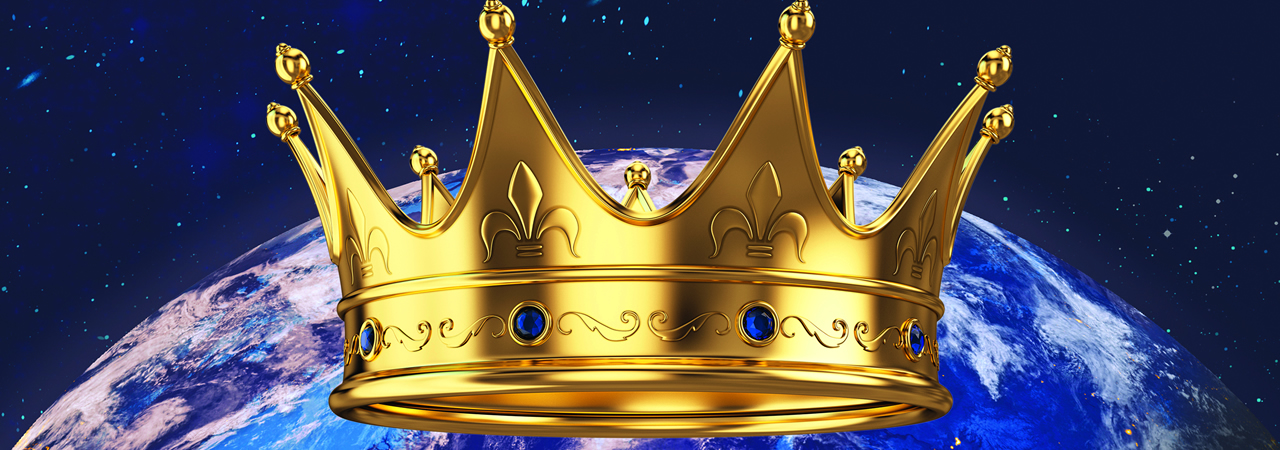What Is the Thousand-Year Kingdom?
Opinions differ among theologians as to what, exactly, the Thousand-Year Kingdom is. A definition from the perspective of biblical prophecy.
The Thousand-Year Kingdom—the Millennium—is the promised Messianic Kingdom. With the appearance of the Messiah as King, the Kingdom will dawn. This refers to the epoch of history when Christ will return personally to bring world peace, God’s rule, complete righteousness, and blessings to the earth. From Revelation 20, we learn that this time will last 1,000 years. And from First Corinthians 15, we learn that Jesus Christ, the King, will hand this Kingdom over to the Father and usher it into eternity.
The Kingdom is the subject of many prophecies in both the Old and New Testaments. We read in the book of the prophet Isaiah:
“It shall come to pass in the last days…he shall judge among the nations, and shall rebuke many people: and they shall beat their swords into plowshares, and their spears into pruninghooks: nation shall not lift up sword against nation, neither shall they learn war any more.…The wolf also shall dwell with the lamb, and the leopard shall lie down with the kid…the cow and the bear shall feed…the sucking child shall play on the hole of the asp…They shall not hurt nor destroy in all my holy mountain: for the earth shall be full of the knowledge of the Lord, as the waters cover the sea…The whole earth is at rest, and is quiet: they break forth into singing” (Is 2:2-4; 11:6-9; 14:7).
These verses show that this Kingdom will satisfy the deepest longings of all individuals and nations here on earth. It brings renewal of creation, changes in nature and, above all, a worldwide knowledge of God.
All of this will be possible because Satan will have been bound in advance and locked in the abyss. Temptation will no longer be a reality during this time. Jesus’ kingship will be God’s self-justification.
 Although this Kingdom was discredited by sects or theologians as a “carnal Jewish expectation” due to certain exaggerations, and perverted by the world as some kind of Shangri-la, the biblical testimony is clear: the Kingdom of Jesus Christ brings a sweeping knowledge of religious truth to people that had never existed before. It will be a Kingdom full of spiritual goods, and will bring the visible reign of Jesus Christ on earth. Additionally, Scripture leaves no doubt that we as believers will have a share in it: “…they lived and reigned with Christ a thousand years” (Rev 20:4). The reign of the believers in the Millennial Kingdom will fulfill mankind’s mandate that had been given in Paradise.
Although this Kingdom was discredited by sects or theologians as a “carnal Jewish expectation” due to certain exaggerations, and perverted by the world as some kind of Shangri-la, the biblical testimony is clear: the Kingdom of Jesus Christ brings a sweeping knowledge of religious truth to people that had never existed before. It will be a Kingdom full of spiritual goods, and will bring the visible reign of Jesus Christ on earth. Additionally, Scripture leaves no doubt that we as believers will have a share in it: “…they lived and reigned with Christ a thousand years” (Rev 20:4). The reign of the believers in the Millennial Kingdom will fulfill mankind’s mandate that had been given in Paradise.
The Millennium Is Forthcoming
Although there are commendable Bible teachers who believe that the Millennium shouldn’t be taken literally, and that it will be identical to the time of the Church of Jesus (amillennialism), we believe (like nearly all the church fathers of the first two centuries) that Jesus will come again to establish His literal, visible Kingdom. In anticipation of the second coming of Jesus prior to the Millennium, we therefore call ourselves premillennialists.
There are many reasons for believing that the Millennium is yet to come:
First, Jesus prayed for the coming of this blessed time in the Lord’s Prayer: “Thy kingdom come.” In this way, he was signaling that the Kingdom—beyond the form of God’s Kingdom as it exists today—is the goal of all redemptive history, which still awaits fulfillment.
Second, Jesus was remembering the Kingdom when He spoke of judgment upon the nations. At the time of this judgment—which occurs at His Second Coming—He will say to His own, “Come, ye blessed of my Father, inherit the kingdom prepared for you from the foundation of the world” (Matt 25:34). If He will say this at His Second Coming, this Kingdom is still in the future and could never, ever be synonymous with the Church Age.
Third, the Apostles also demonstrated their expectation of a future Kingdom when they asked the Lord whether this Kingdom would coincide with the time of the Church: “Lord, wilt thou at this time restore again the kingdom to Israel?” (Acts 1:6). They received a negative answer. So, they also believed that Israel still had a future as a nation in God’s plan of salvation! That’s why they preached to their own Jewish people that there was a requirement to fulfill both the Kingdom and the future of Israel: “Repent ye therefore, and be converted, that your sins may be blotted out, when the times of refreshing shall come from the presence of the Lord. And he shall send Jesus Christ, which before was preached unto you: Whom the heaven must receive until the times of restitution of all things, which God hath spoken by the mouth of all his holy prophets since the world began” (Acts 3:19-21).
Fourth, the Millennial Kingdom is in the future because it follows naturally from the course of redemptive history. Ephesians 1 describes the blessings for believers that the Father, the Son, and the Holy Spirit will give to His own at different times:
1. Before the world began, the Father determined the sonship of His own (vv. 4-6).
2. During the time that Jesus lived on earth, the Son worked redemption (vv. 7-9).
3. In the future consummation, believers will be granted the blessings of the Holy Spirit in perfection. “Which is the earnest of our inheritance until the redemption of the purchased possession…” (v. 14).
This includes both the future inheritance (vv. 11, 14) and that in the “fulness of times he might gather together in one all things in Christ, both which are in heaven, and which are on earth…” (v. 10). This expresses that one day, in the fulfillment of the times (plural!), everyone on earth will stand under one head; namely, the reign of Jesus Christ. To “gather together in one all things” actually means to bring it under headship; that is, to put it under one head. This will be the “fullness of times, [when] he might gather together in one all things in Christ.” And this has to be a reference to the Millennium because:
a) It obviously occurs in the future, and is therefore unfulfilled in the present Church Age.
b) It is a (salvation) economy or administration—that is, a redemptive time that brings all the others together or brings them to their goal; precisely, the “fulfillment of the [many] times.” Such (salvation) times (Greek kairos) are times in which God reveals Himself differently (e.g. under law, under grace). The word kairos characterizes a time according to its content and essence, as a kind of time of revelation. Man must recognize this current time as a time of grace and opportunity for himself (cf. Tit 1:3).
c) The administration of the fullness of times brings us His Second Coming and the reign of the King. The “fullness of the time” (Gal 4:4; Gr. chronos, chronological time) was reached to some degree in the middle of history, when Jesus Christ was born as a human being at His first coming in order to accomplish redemption. And the Millennial Kingdom will advance the goal: “The kingdoms of this world are become the kingdoms of our Lord, and of his Christ” (Rev 11:15).
d) We can also see from the Lord’s Prayer that the Millennium will be when the times will be fulfilled: “Thy will be done in earth, as it is in heaven” (Matt 6:10). Only in this future Kingdom will all people come under one head, and only in the Millennium will God’s will be obeyed in both places; namely, on “earth, as it is in heaven.” Only in the Millennial Kingdom will things in heaven and things on earth be united in Him, under His head (Eph 1:10).
So, we can truly say that the Gospel is a “Gospel of the Kingdom,” because it leads to God’s reign. After thousands of years, God’s glory will be made great in the Millennium, and the Lord will be justified in all His actions. In addition, the promises of the Old Testament covenants (namely, the return and spiritual restoration of Israel) will be entirely fulfilled.
Midnight Call - 02/2022


